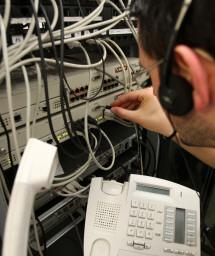The Chamber of Deputies on Thursday approved a government bill to curb the use of wiretapping amid strong protests from the opposition, the national association of magistrates, publishers and the journalists' union.
Key parts of the bill won approval in a confidence vote on Wednesday and following a request by the centre-right opposition, the entire measure was approved in a secret ballot on Thursday.
The measure was passed with 318 votes in favour, 224 against and one absention as some MPs shouted ''clowns, clowns''.
The bill now moves to the Senate, where it should have no problems being approved since the centre right has a comfortable majority.
The measure would restrict the use of wiretaps to investigate serious crimes: mafia, terrorism, corruption of public officials and accepting kickbacks, human trafficking, child pornography, loan sharking and economic and fiscal crimes like insider trading.
In general, wire taps would not be allowed to investigate crimes which carry sentences of less than five years.
Journalists who publish transcripts of wiretaps face suspended jail sentences of six months to a year.
The bill envisages that a panel of magistrates will be needed to authorize the wire taps, compared to only one at present.
There will be a 60-day limit on wire taps and curbs will be set on the amount of funds which can be used to carry them out.
The phones of intelligence agents and officials' body guards can only be tapped with the prior consent of the premier's office.
Public officials responsible for not monitoring leaks of content of taped conversations will be fined.
The government argues that the measure is necessary to defend the privacy of citizens whose private conversations with suspects targeted by probes have, in recent years, often ended up in the press.
Another argument for the reform - a campaign promise by Premier Silvio Berlusconi - is that large amounts of funds are wasted on inconsequential wire taps, at a time when the government is trying to curb spending.
According to the government, Italy leads other European countries and even the United States in the amount of wire taps carried out annually by investigators.
Enrico Costa, majority representative on the House's Justice Committee, has said that Italy carries out some 120,000 wire taps each year, compared to some 20,000 in France and an average of 5,000 in other European countries.
The opposition says that no more than 20-25,000 people are subject to wire taps each year.
The centre left also stressed that Italy's most recent major scandals first emerged from media transcripts of wiretaps.
Newspapers' leaked transcripts forced Bank of Italy governor Antonio Fazio to resign in 2005, unveiled the soccer match-rigging 'calciopoli' scandal in 2006 and a 2008 probe in Milan where a private clinic was fleecing the national health service by carrying out unnecessary and at times fatal surgery on patients.
Journalists' union Fnsi and publishers' association Fieg have protested with parliament, saying the measure is unconstitutional and ''would violate the fundamental right to freedom of the press, guaranteed by (the Italian) constitution and by the European convention of the rights of man''.
Fnsi urged parliament to make ''the needed corrections'' to the bill, warning that it was ready to strike against the measure, carry out forms of civil disobedience and file suits with the Constitutional Court and the European Court of Justice.
National Association of Magistrates (ANM) said that if approved the bill would spell ''the death of the penal system in Italy'' and would ''shackle prosecutors' hands and feet''.
National Antimafia prosecutor Pietro Grasso also weighed in, saying the measure will limit investigations, and stressing that the judiciary and the press were useful because they were the ''watchdogs over those in power''.
''Whoever is against it, may not like this control''.
The centre left has written to President Giorgio Napolitano to express ''deep dismay'' over what it called ''a politically subversive'' measure.













